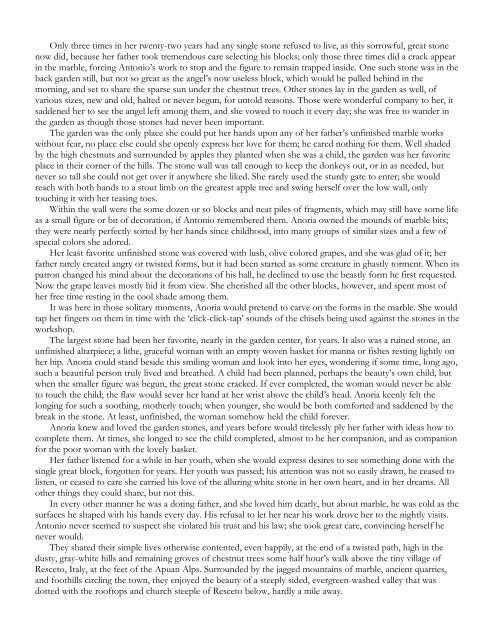Volume Three - WordPress.com — Get a Free Blog Here
Volume Three - WordPress.com — Get a Free Blog Here
Volume Three - WordPress.com — Get a Free Blog Here
You also want an ePaper? Increase the reach of your titles
YUMPU automatically turns print PDFs into web optimized ePapers that Google loves.
Only three times in her twenty-two years had any single stone refused to live, as this sorrowful, great stone<br />
now did, because her father took tremendous care selecting his blocks; only those three times did a crack appear<br />
in the marble, forcing Antonio’s work to stop and the figure to remain trapped inside. One such stone was in the<br />
back garden still, but not so great as the angel’s now useless block, which would be pulled behind in the<br />
morning, and set to share the sparse sun under the chestnut trees. Other stones lay in the garden as well, of<br />
various sizes, new and old, halted or never begun, for untold reasons. Those were wonderful <strong>com</strong>pany to her, it<br />
saddened her to see the angel left among them, and she vowed to touch it every day; she was free to wander in<br />
the garden as though those stones had never been important.<br />
The garden was the only place she could put her hands upon any of her father’s unfinished marble works<br />
without fear, no place else could she openly express her love for them; he cared nothing for them. Well shaded<br />
by the high chestnuts and surrounded by apples they planted when she was a child, the garden was her favorite<br />
place in their corner of the hills. The stone wall was tall enough to keep the donkeys out, or in as needed, but<br />
never so tall she could not get over it anywhere she liked. She rarely used the sturdy gate to enter; she would<br />
reach with both hands to a stout limb on the greatest apple tree and swing herself over the low wall, only<br />
touching it with her teasing toes.<br />
Within the wall were the some dozen or so blocks and neat piles of fragments, which may still have some life<br />
as a small figure or bit of decoration, if Antonio remembered them. Anoria owned the mounds of marble bits;<br />
they were nearly perfectly sorted by her hands since childhood, into many groups of similar sizes and a few of<br />
special colors she adored.<br />
Her least favorite unfinished stone was covered with lush, olive colored grapes, and she was glad of it; her<br />
father rarely created angry or twisted forms, but it had been started as some creature in ghastly torment. When its<br />
patron changed his mind about the decorations of his hall, he declined to use the beastly form he first requested.<br />
Now the grape leaves mostly hid it from view. She cherished all the other blocks, however, and spent most of<br />
her free time resting in the cool shade among them.<br />
It was here in those solitary moments, Anoria would pretend to carve on the forms in the marble. She would<br />
tap her fingers on them in time with the ‘click-click-tap’ sounds of the chisels being used against the stones in the<br />
workshop.<br />
The largest stone had been her favorite, nearly in the garden center, for years. It also was a ruined stone, an<br />
unfinished altarpiece; a lithe, graceful woman with an empty woven basket for manna or fishes resting lightly on<br />
her hip. Anoria could stand beside this smiling woman and look into her eyes, wondering if some time, long ago,<br />
such a beautiful person truly lived and breathed. A child had been planned, perhaps the beauty’s own child, but<br />
when the smaller figure was begun, the great stone cracked. If ever <strong>com</strong>pleted, the woman would never be able<br />
to touch the child; the flaw would sever her hand at her wrist above the child’s head. Anoria keenly felt the<br />
longing for such a soothing, motherly touch; when younger, she would be both <strong>com</strong>forted and saddened by the<br />
break in the stone. At least, unfinished, the woman somehow held the child forever.<br />
Anoria knew and loved the garden stones, and years before would tirelessly ply her father with ideas how to<br />
<strong>com</strong>plete them. At times, she longed to see the child <strong>com</strong>pleted, almost to be her <strong>com</strong>panion, and as <strong>com</strong>panion<br />
for the poor woman with the lovely basket.<br />
Her father listened for a while in her youth, when she would express desires to see something done with the<br />
single great block, forgotten for years. Her youth was passed; his attention was not so easily drawn, he ceased to<br />
listen, or ceased to care she carried his love of the alluring white stone in her own heart, and in her dreams. All<br />
other things they could share, but not this.<br />
In every other manner he was a doting father, and she loved him dearly, but about marble, he was cold as the<br />
surfaces he shaped with his hands every day. His refusal to let her near his work drove her to the nightly visits.<br />
Antonio never seemed to suspect she violated his trust and his law; she took great care, convincing herself he<br />
never would.<br />
They shared their simple lives otherwise contented, even happily, at the end of a twisted path, high in the<br />
dusty, gray-white hills and remaining groves of chestnut trees some half hour’s walk above the tiny village of<br />
Resceto, Italy, at the feet of the Apuan Alps. Surrounded by the jagged mountains of marble, ancient quarries,<br />
and foothills circling the town, they enjoyed the beauty of a steeply sided, evergreen-washed valley that was<br />
dotted with the rooftops and church steeple of Resceto below, hardly a mile away.







